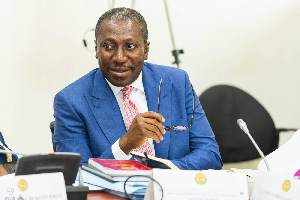Rebecca Akufo-Addo, wife of Nana Addo Dankwa Akufo-Addo, Presidential Candidate of the New Patriotic Party, has observed that the nation’s effort to encourage more women into active politics stands defeated by the current trend of insults in the nation’s political discourse.
She fears “the more society gives free oxygen to dirty politics that seeks to destroy reputations, the less good people, especially women, will find politics a career option worth pursuing.”
“I find much of the politics we do in Ghana disheartening and a major disincentive for the many brilliant young women who may have considered politics as a career option. I dislike what we do to ourselves in the name of politics. I dislike the kind of politics we do that gets in the way of the real politics about improving lives,” Mrs Akufo-Addo decried.
She was addressing students of the Kwame Nkrumah University of Science and Technology on “The Role of the Modern Woman in Politics” yesterday.
The prospective First Lady said even though she is not a professional politician, and enjoys her work as a florist, as well as her charity work for the elimination of malaria, “I will be the first to say we need many more women in politics. We need more women around the table of decision-making.”
Mrs Akufo-Addo paid a growing tribute to some women in Africa who have risen above the odds to become worthy examples of how women can excel in politics. She mentioned President Johnson-Sirleaf of Liberia, and opposition leader Hellen Zille of South Africa as women who “have shown what it means to be bold as a woman in the man’s world of politics.”
Back in the country, she said this about former First Lady, Mrs Rawlings: “I was not a supporter of the 31st December coup, but, I must say that, as a woman, I admire and respect the boldness and perseverance of Nana Konadu Agyeman Rawlings.”
Mrs Akufo-Addo bemoaned the fast decline in the number of women representation in Parliament, adding that it does not speak well of a nation that claims to be advocating women empowerment.
“Women’s political role in Ghana may be growing but too gingerly. In 1992, there were 16 women in the 200-member parliament; 18 women in 1996, and 19 in the 2000 parliament. In Ghana’s 2004 parliament, we made another modest progress with 24 women MPs in the 230-seat parliament. But, in 2008, we moved five seats backwards, with only 19 women. With more women MPs not returning after 2012, we are not foreseeing any significant rise in the next parliament,” she noted.
Mrs Akufo-Add called for a deliberate plan for political grooming of more women for political positions, stressing “if we want to see more women in politics then we have to groom more women as leaders and if we have to groom more women as leaders then we have to allow more girls to prepare and see themselves as potential leaders.”
She stressed the need for “freedom of choice” to every Ghanaian child in respect of the career they want to pursue, instead making some career the preserve of men or women.
“Essentially, I believe a man should be free to choose to be a nurse if he wants to and a woman to be a truck driver if she desires. I believe what women want is not special favours from society. Our only demand is to be given the same opportunities as men to compete for any position available,” she stressed.
General News of Wednesday, 21 March 2012
Source: --
Mrs Akufo-Addo: Politics Of Insult Is Disincentive For Women
Entertainment











